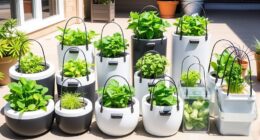To boost your herbs’ flavor, feed them during their active growth phases with organic liquid feeds or slow-release fertilizers, especially when the soil feels rich and well-draining. Water when the top inch of soil dries out, adjusting for hot weather, and incorporate compost or organic matter to improve soil health. Keep soil pH balanced and seasonally tweak watering and feeding. Want to uncover more tips for maximizing herb taste? Stay tuned to learn additional secrets.
Key Takeaways
- Feed herbs during active growth with organic liquid feeds or slow-release fertilizers for optimal flavor development.
- Apply fertilizers in early morning or late afternoon to maximize nutrient absorption and minimize stress.
- Use balanced nutrients rich in nitrogen, phosphorus, and potassium to promote healthy leaf growth and aromatic oils.
- Adjust feeding frequency seasonally, increasing during peak growing months and reducing in cooler periods.
- Avoid over-fertilizing, which can dilute essential oils and dull herb flavor; maintain a consistent, moderate feeding schedule.

Herbs are the secret to elevating the flavor of your dishes, and choosing the right ones can make all the difference. But to truly *access* their full potential, you need to pay attention to how and when you feed them. Proper feeding helps herbs develop stronger, more vibrant flavors, making your culinary creations stand out. The first step is understanding watering schedules, which are *essential* for healthy growth and *best* taste. Overwatering can drown roots and dilute essential oils, dulling the herbs’ flavor, while underwatering causes stress that hampers their ability to produce aromatic compounds. Find a consistent watering routine—usually when the top inch of soil feels dry—and stick to it. This *guarantees* your herbs receive the moisture they need without becoming waterlogged. Adjust your watering based on the season; in hot weather, more frequent watering may be necessary, but always check soil moisture first. Additionally, integrating sound design techniques like layering sounds can be likened to combining different herbs to create a richer flavor profile, enhancing the overall sensory experience.
In addition to watering, soil amendments play a *key* role in enhancing flavor. Healthy soil rich in organic matter provides a strong foundation for herbs to thrive and develop intense flavors. Incorporate compost or well-rotted organic matter into your soil to improve its structure, nutrient content, and drainage. This creates an environment where roots can expand freely, absorbing essential nutrients that support the production of flavorful oils and compounds. Be mindful of the specific needs of each herb; for example, basil prefers rich, well-draining soil, while rosemary tolerates sandier, less fertile conditions. Regularly testing your soil’s pH and nutrient levels helps you make targeted amendments—adding lime to raise pH or sulfur to lower it if necessary. This fine-tuning *guarantees* your herbs are not just surviving but flourishing, with their essential flavors concentrated and vibrant.
Feeding your herbs isn’t just about adding fertilizer; it’s about creating a balanced environment that promotes healthy growth and intense flavor development. Use organic liquid feeds or slow-release fertilizers designed for herbs, applying them at the right time—often during active growth periods. You’ll see better leaf production, stronger scent, and richer taste when your plants are well-fed through proper watering and soil management. Remember, plants are living organisms that respond best to consistency and attention. By maintaining a disciplined watering schedule and enriching your soil with appropriate amendments, you set the stage for herbs to reach their *peak* flavor potential. When you combine these practices, you’ll notice the difference in your herbs’ aroma, taste, and overall quality, transforming your cooking and impressing your guests.
Frequently Asked Questions
Can Overfeeding Herbs Ruin Their Flavor?
Yes, overfeeding herbs can ruin their flavor. Too much fertilizer causes nutrient imbalance, which can make herbs grow rapidly but lose their intense taste. Additionally, overfeeding often leads to watering habits that are too frequent or excessive, risking root rot and poor health. To keep your herbs flavorful, feed them appropriately, follow recommended amounts, and avoid overdoing it, ensuring they stay healthy and taste their best.
Which Herbs Benefit Most From Late-Season Feeding?
You might think feeding herbs late in the season isn’t necessary, but some actually benefit. Herbs like basil and cilantro thrive with late-season feeding, boosting their flavor and growth. This also enhances companion planting, helping them resist pests naturally. By providing a gentle feed, you support their health and maximize taste, especially when the growing season winds down. Just avoid overfeeding, which can harm their natural flavor.
How Does Soil Type Affect Herb Feeding Schedules?
Soil type greatly influences your herb feeding schedule because soil composition affects nutrient availability and drainage. For example, sandy soils drain quickly, so you might need to water more frequently and add organic matter to improve nutrient retention. Conversely, clay soils retain water longer, requiring less frequent watering. Adjust your feeding routine based on your soil’s characteristics to ensure herbs get the right nutrients without over or underwatering.
Are Organic Fertilizers Better for Flavor Enhancement?
Did you know organic fertilizers can considerably enhance herb flavor? You should consider using organic nutrients because they promote natural growth and improve flavor. Unlike synthetic options, organic fertilizers release nutrients slowly, giving herbs time to absorb them fully. This results in richer, more vibrant flavors. For maximum flavor improvement, feed your herbs with organic nutrients regularly, especially during active growth, to keep them healthy and bursting with taste.
How Do I Prevent Nutrient Deficiencies in Herbs?
To prevent nutrient deficiencies in your herbs, you need to keep up with proper herb watering and pest prevention. Regular watering ensures your herbs get consistent nutrients, avoiding stress that can lead to deficiencies. Additionally, protect your plants from pests, which can sap essential nutrients. Use organic pest prevention methods and check your herbs frequently. Healthy, well-maintained herbs are less likely to develop deficiencies and will taste better too.
Conclusion
Now that you know when and how to feed your herbs, you’ll unseal their full flavor potential, making every dish sing. Remember, just like a seasoned alchemist of old, timing and care transform simple herbs into culinary gold. Don’t forget, a little patience and the right nutrients can turn your garden into a veritable treasure chest of taste. So go ahead—nurture those herbs and enjoy the rich, fragrant rewards that await.









